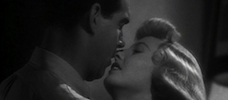Reviews
Douglas Sirk
USA, 1956
Credits
Review by Jenny Jediny
Posted on 17 April 2010
Source Masters of Cinema DVD
Categories A Criminal Couple
After all these years. Yes, all these years…”
Blue Moon, you saw me standing alone, Without a dream in my heart, Without a love of my own.
Douglas Sirk’s only reserve about the “tomorrow” in his film was that “there have been too many ‘tomorrow’ titles.”1 Sirk was right, although his usage is more equivalent to the loaded meaning of the word in movie scripts – Scarlett O’Hara’s weary mantra that “after all, tomorrow is another day” – or more bleakly, in various works of literature; for example, Vladimir and Estragon’s eternal wait for tomorrow, when Godot could, but won’t, appear. Just as beautifully There’s Always Tomorrow soaks up this irony, as two middle-aged lovers play out an old romance in their present-day trappings. Before Clifford and Norma even glimpse one another, we know how the cards will fall.
The heartbreak in this film, as in many of Sirk’s other Hollywood productions, takes place in polished, well-run upper-class households. Despite successful careers, freedom to travel and beautiful homes, the characters in these films are in some way emotionally lacking, and Clifford Groves is no exception. What accounts for success before American eyes – Clifford is a successful toy-maker who runs his own company, and is married with three children – is skewed from Sirk’s camera’s perspective.
Clifford often seems more man-child than man. There are the toys, certainly a whimsical career choice, but both Cliff’s products, such as the unforgettable Rex, “the walkie-talkie robot,” and his factory are shot (by DP Russell Metty, also responsible for Written on the Wind, Imitation of Life and Touch of Evil) with the same distinct, crisscrossing black and white shadows that fall within the Groves’ household. Combined with the consistent Los Angeles rain, Cliff’s life has ominous undertones, further underlined when we meet his family. No one has time for father, including wife Marion, whose level, motherly tone when conversing with Cliff indicates she holds him in the same regard as her children. (Her reaction after Cliff returns from a vigorous weekend of horseback riding and swimming, to “take a hot bath” to soothe his supposedly sore bones is a sad implication that she is certainly more caretaker than partner.)
And then Norma Vale rings the doorbell and walks back into Cliff’s life. A former toy factory employee turned successful New York dressmaker, Norma is the independent, divorced career woman, who just happens to have a voice that would melt butter. As we’ve seen the chemistry between Fred MacMurray and Barbara Stanwyck in action before, we know they’ll click again. However, the stakes are a bit different this time—middle-age obligations prove more difficult to shake than the law.
With Norma, or even when he’s alone, proven by the women visibly checking Cliff out when he strolls into a Palm Valley resort, Cliff is suddenly more masculine, more than someone’s husband or father. Seeing him only as “dad” is precisely what hurts both Vinnie and Ellen’s relationship with their father, as they begin to suspect the beginnings of an affair. It’s practically ingrained in teenagers not to see their parents as anything but mom and dad, but Sirk puts a particularly hard spin on it; emphasized their spoiled nature from the outset of the film, the Groves children suffer the pangs of growing up almost as painfully as Cliff endures the loss of “tomorrow.”
Like the best of Sirk’s films, There’s Always Tomorrow pinpoints genuine heartache within valleys and waves of emotion. Norma and Cliff recreate with their past – and the possibility of a future together – as isolated memories resurface; the walk through the toy factory, the revelation of a memento in Norma’s purse, and the recurrence of Rodgers and Hart’s melancholy “Blue Moon” both in the film and within the score all cause the couple to swoon just as they did years ago. But these are moments from yesterday, a fact that Norma realizes more than Cliff wants to. Marriages may end in divorce, but even if the Groves family was to dissolve, Norma knows Cliff could never really let go. The “sweet, naïve” man must uphold his obligations, and Cliff watches his dream fly away, secure within the walls of his suburban home once more.
- Jon Halliday. Sirk on Sirk. P 124.↩
More A Criminal Couple
We don’t do comments anymore, but you may contact us here or find us on Twitter or Facebook.







